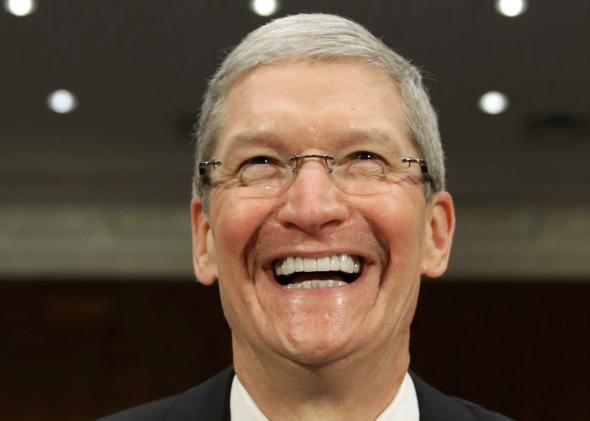Apple CEO Tim Cook made news last week when he came out as a gay man in an op-ed for Bloomberg Businessweek. “While I have never denied my sexuality, I haven’t publicly acknowledged it either, until now,” writes Cook. “So let me be clear: I’m proud to be gay, and I consider being gay among the greatest gifts God has given me.” Later in the essay, he addresses the issue of privacy:
I’ll admit that this wasn’t an easy choice. Privacy remains important to me, and I’d like to hold on to a small amount of it. I’ve made Apple my life’s work, and I will continue to spend virtually all of my waking time focused on being the best CEO I can be. That’s what our employees deserve—and our customers, developers, shareholders, and supplier partners deserve it, too. Part of social progress is understanding that a person is not defined only by one’s sexuality, race, or gender. I’m an engineer, an uncle, a nature lover, a fitness nut, a son of the South, a sports fanatic, and many other things. I hope that people will respect my desire to focus on the things I’m best suited for and the work that brings me joy.
It was this section, about privacy, that gave me pause amid an otherwise well-executed statement: All along, much of the LGBTQ community—especially the queer media—has been denying Cook that basic right. Indeed, if you follow such things at all, you know that LGBTQ outlets have long presumed Cook’s sexuality. OUT magazine has included him in its “Power 50” list, an annual who’s who showcasing dozens of the world’s most powerful “out” individuals, ranging from folks like Perez Hilton to Laverne Cox to RuPaul—the real game changers in the LGBTQ world. The problem is, many corralled into these roundups aren’t actually “out” at all—proving that these days, being out about one’s sexual orientation or gender identity is more of a public judgment than a personal decision, specifics of the situation be damned.
Some have pushed back against OUT, arguing that it’s irresponsible to post their names under a banner that they have not chosen. In 2009, IAC chairman Barry Diller and conservative news aggregator Matt Drudge—neither of whom publically identify as gay or bisexual—condemned the magazine for reckless reporting. The magazine’s penchant for outing closeted celebs goes back to 2007, when Anderson Cooper and Jodie Foster were included on the list.
In Cook’s case, of course, the stakes are relatively small. Given that his sexuality has been presumed for years and his position in society as the CEO of one of the world’s most recognizable brands is pretty secure, it’s not as though an official announcement would really harm him. But what about Dr. Essay Anne Vanderbilt, Lucy Meadows, or Mike Penner, three individuals forced out by the same cultural expectation responsible for spreading information about Cook and rumors about the likes of Drudge? What about Bruce Jenner, who has lately become tabloid fodder based on speculation that he’s transgender?
As many readers will know, Vanderbilt, Meadows, and Penner all took their lives shortly after being outed. Compulsory public outing, a gleeful LGBTQ media pastime, comes with a literal body count. And even when outing doesn’t end in tragedy, it’s still an invasion of privacy of the worst kind. Some will argue that closeted policymakers and pundits who act against community interests do not deserve this right to privacy, and perhaps they’re right. Similarly, a public figure’s right to privacy is debatable, but then again, so is the very definition of “public figure.” (Does Jenner, a minor reality TV star at this point, really count?) There is a greater good involved here, as famously mentioned by slain LGBTQ icon Harvey Milk in his famous “You must come out,” speech. But too often we’ve witnessed that the costs of coming out are unbearably high.
Whether Jenner comes out as transgender or not, he needs to be allowed to handle the situation on his own terms. His life—as Vanderbilt’s, Meadows’, and Penner’s sad deaths prove—may very well hang in the balance. And in general, it would be best if LGBTQ media and gossip publications refrained from engaging in this type of speculation. Too much is at risk, and it only further establishes a culture in which outing can result in consequences far worse than the loss of privacy. While what Cook has done will no doubt inspire others to do the same, helping to normalize the existence of LGBTQ leaders, the fact that it was hardly a free choice reminds us that we live in a culture of indiscriminate outing, in which leaders like Cook can thrive, while others, like Meadows, lose their lives as a result. There simply has to be a better way to encourage those like Cook without endangering the lives of more vulnerable individuals.
